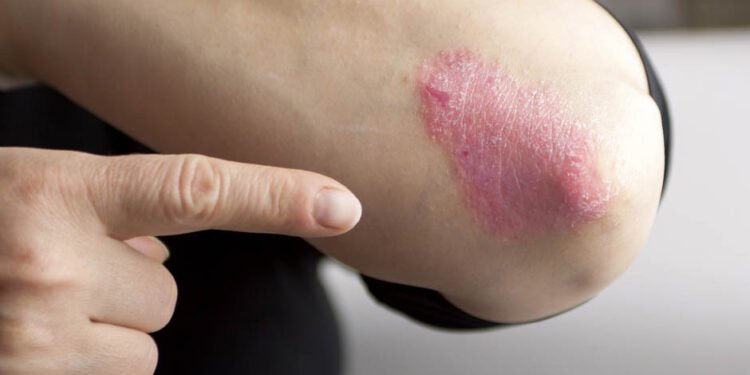Psoriasis is a chronic autoimmune skin disorder characterized by the rapid growth of skin cells, leading to the formation of thick, scaly patches on the skin’s surface. It is a non-contagious condition that affects millions of people worldwide.
Psoriasis can occur at any age, but it most commonly develops between the ages of 15 and 35. The exact cause of psoriasis is not fully understood, but it is believed to result from a combination of genetic and environmental factors.
The immune system plays a significant role in psoriasis. In a healthy immune system, T cells help protect the body against harmful substances. However, in individuals with psoriasis, T cells mistakenly attack healthy skin cells, triggering an immune response.
This immune response leads to the rapid production of new skin cells, causing the characteristic symptoms of psoriasis, including red, inflamed patches covered with silvery scales.
Psoriasis can vary in severity and can affect different parts of the body, including the scalp, elbows, knees, and lower back. The symptoms can range from mild, with small patches of affected skin, to severe, with large areas of skin involvement.
In addition to the physical symptoms, psoriasis can also have a significant impact on a person’s quality of life, causing emotional distress, and social isolation.
While there is no known cure for psoriasis, various treatment options are available to manage the symptoms and improve the quality of life for individuals with psoriasis. These treatments aim to reduce inflammation, slow down the rapid growth of skin cells, and alleviate symptoms such as itching.
Understanding the Cause of Psoriasis
Psoriasis is believed to result from a combination of genetic and environmental factors. Research suggests that the immune system plays a significant role in the development of psoriasis. In a healthy immune system, T cells help protect the body against harmful substances, such as bacteria and viruses.
However, in individuals with psoriasis, T cells mistakenly attack healthy skin cells, triggering an immune response that leads to the rapid production of new skin cells. This abnormal immune response is influenced by various factors, including genetics, stress, infections, and certain medications.
Treating the Root Cause
Lifestyle Modifications: Lifestyle modifications can play a vital role in managing the root cause of psoriasis. Maintaining a healthy weight, engaging in regular exercise, and adopting a balanced diet can help reduce inflammation and improve overall immune function.
Smoking cessation and limiting alcohol consumption are also crucial steps, as both smoking and excessive alcohol intake can worsen psoriasis symptoms.
Stress Management: Chronic stress has been identified as a trigger for psoriasis flare-ups. Techniques such as mindfulness meditation, deep breathing exercises, yoga, and other stress reduction strategies can help manage stress levels and potentially reduce the frequency and severity of psoriasis outbreaks.
Dietary Adjustments: While there is no specific psoriasis diet, certain dietary adjustments may have a positive impact on symptoms. Including anti-inflammatory foods, such as fruits, vegetables, whole grains, fatty fish rich in omega-3 fatty acids, may help reduce inflammation in the body and alleviate psoriasis symptoms for some individuals.
Topical Treatments: Topical treatments, such as corticosteroids, vitamin D analogs, and retinoids, are commonly prescribed to manage psoriasis symptoms. While these treatments primarily target symptom relief, they can also help slow down skin cell growth and reduce inflammation in the affected areas. It is essential to follow the instructions provided by healthcare professionals when using topical treatments.
Phototherapy: Phototherapy involves exposing the skin to ultraviolet (UV) light, either natural sunlight or artificial light sources. UVB and PUVA are the two primary forms of phototherapy used for psoriasis treatment. Phototherapy works by slowing down the production of skin cells and reducing inflammation.
Regular sessions under the supervision of a functional medicine dermatologist can effectively manage psoriasis symptoms.
Systemic Medications: In severe cases of psoriasis, where other treatments have not been effective, systemic medications may be prescribed. These medications work by targeting the immune system and suppressing the abnormal immune response.
Systemic medications include oral retinoids, methotrexate, cyclosporine, and biologics. They often require close monitoring and can have potential side effects, so they should be used under medical supervision.
Emerging Therapies: Ongoing research and advancements in medical science have led to the development of new therapies for psoriasis. Targeted biologic drugs that specifically inhibit certain immune system proteins have shown promising results in treating psoriasis by addressing the root cause of psoriasis.
Conclusion
While there is no definitive cure for psoriasis, targeting the root cause of the condition is crucial for long-term management and relief. Lifestyle modifications, stress management, dietary adjustments, topical treatments, and emerging therapies all play a role in addressing the underlying causes of psoriasis.
It is important to work closely with a functional medicine dermatologist to develop an individualized treatment plan that combines different approaches to effectively manage symptoms, improve quality of life, and potentially achieve remission.












